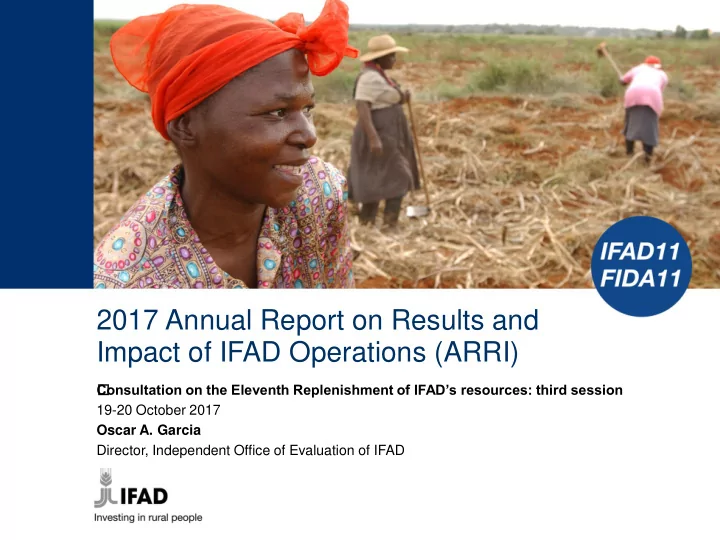

2017 Annual Report on Results and Impact of IFAD Operations (ARRI) Consultation on the Eleventh Replenishment of IFAD’s resources: third session 19-20 October 2017 Oscar A. Garcia Director, Independent Office of Evaluation of IFAD
Overall, improved performance of IFAD operations from 2009 Improvement Overview of main evaluation criteria, between IFAD8 and IFAD9 % projects rated moderately satisfactory or better statistically 95 significant 90 85 80 Percentage 75 70 65 60 55 50 45 2007-2009 2008-2010 2009-2011 2010-2012 2011-2013 2012-2014 2013-2015 Completion years Rural poverty impact Overall achievement Government as a partner IFAD as a partner Project Performance 1
IFAD project performance on par and better than other IFIs External benchmarking with agricultural portfolio of other IFIs Percentage of projects with performance rated MS + IFAD WB Global 2002-2015 2002-2015 75 76 IFAD Asia AsDB Asia 2002-2015 2002-2014 88 65 Africa IFAD Africa AfDB 2002-2015 2002-2013 68 44 2
Most criteria are below IFAD9 and IFAD10 RMF targets Evaluation criteria assessment (2013-2015) % projects rated moderately satisfactory or better 100 90 80 70 Percentage 60 50 40 IFAD10/IFAD9 30 Targets 20 IFAD9 Target 10 only 0 3
Limited progress in non-lending activities, except Knowledge Management • Performance of non-lending activities: mostly moderately satisfactory IFAD10 Targets 100 Partnerships (90%) % moderately satisfactory or better Policy dialogue 90 Partnership building (85%) 80 70 60 50 Policy dialogue Knowledge 40 management 30 20 10 0 2006-2008 2007-2009 2008-2010 2009-2011 2010-2012 2011-2013 2012-2014 2013-2015 2014-2016 Evaluation years 4
How can IFAD raise country programme performance to fully satisfactory? 5
2017 ARRI findings • Good operational performance is linked to well-defined targeting strategies . • Promoting gender equality and women’s empowerment is critical to realize Agenda 2030. • Raising M&E performance requires disaggregated evidence in strategic areas – climate change and food security. • Successful management of fiduciary responsibility requires rigor, not rigidity. • KM, partnerships and policy dialogue area catalysts for greater rural poverty impact. 6
Recommendations • Fully Satisfactory Performance: Build on strengths, address bottlenecks and introduce a new modus operandi. • Gender Transformation: Introduce gender transformative approaches to substantially contribute to SDGs. • Better evidence: Improve data granularity in strategic areas of focus – climate change and food security. • Non-lending activities : Systematize KM, partnership and policy engagement – to unlock their potential to scale up country program results • Fiduciary requirements: Extend country differentiation to procurement, while supporting long-term national capacity improvements • 2018 ARRI Learning Theme: “Pro - poor” targeting strategies 7
Recommend
More recommend